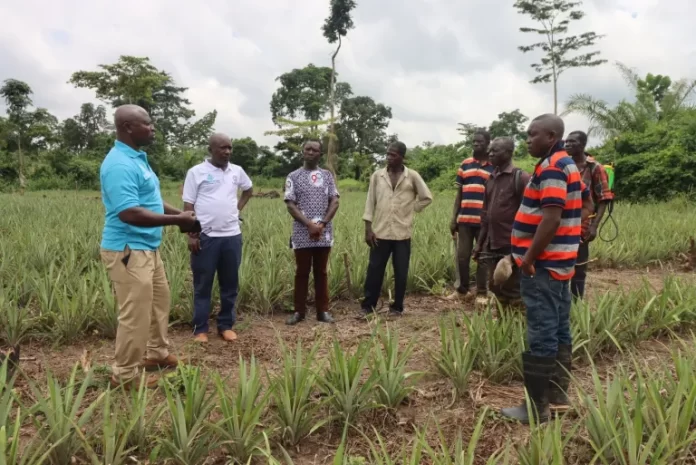The US Government, through the USAID-supported Feed the Future Ghana Mobilizing Finance in Agriculture (USAID MFA) Activity, under the COVID-19 Relief and Resilience Challenge Fund, is assisting in expanding pineapple production in the Ashanti Region to create jobs, especially for the youth and women, and produce raw material for the fruits processing industry.
As of August 2023, about 300 smallholder farmers – 20 percent youth – in selected communities in Atwima-Kwanwoma, Sekyere East, Afigya-Kwabre North, Juaben, Ejura, Amansie Central, Amansie West, and Asante Akyem North Districts have benefitted from the introductory phase of the pineapple project as an alternative source of livelihood and enhanced resilience.
The smallholder farmers include the Livelihood Empowerment Against Poverty (LEAP) programme beneficiaries as well as youths under the umbrella of the National Youth Authority (NYA) in the Ashanti Region. Each farmer was given about 5,000 pineapple suckers – planting materials – for a start, and this will increase in subsequent seasons. The introductory phase covers about 120 acres.
The farmers have received free pineapple suckers for cultivation; and on top of it, they have received integrated pests management (IPM) training. Departments of Agriculture in Atwima-Kwanwoma, Sekyere East, and Afigya-Kwabre North Districts as well as NYA Ashanti Region received a tricycle each to assist farmers with their pineapple production activities. The Regional Department of Agriculture, Ashanti is also providing extension services to the farmers.
The initiative is geared toward positioning the Ashanti Region as another pineapple production hub in Ghana. The leading pineapple production areas in the country are Akuapim South in the Eastern Region and the southern part of the Central Region.
Dr. Victor Antwi, Chief of Party – USAID MFA Activity who disclosed this said an agro-processing company, Bodukwan Farms, and Multi Fruit Processing Factory in Kumasi, has shown interest in buying the pineapple fruits from the farmers when harvested. It has an excess capacity to buy about 12,000 MT of pineapple fruits in the short term, and this could double in the medium term. It will also explore the use of the Kumasi International Airport to develop other products for the export market.
He added: “Other fruit processing companies have shown interest in setting up processing plants in the Ashanti Region to broaden the market base for the farmers. This will also spur more farmers and agricultural investors to set up pineapple farms to take advantage of the promising market. This enhances the potential of processing pineapple in the Ashanti Region for export by taking advantage of the soon-to-be-commissioned Kumasi International Airport”.
Dr. Antwi was speaking at the launch of the Ghana Association of Female Agricultural and Fish Farming Award Winners (GAFAFAW) in Accra. The Association is made up of women who were recognized as best female farmers during the 2022 National Farmers’ Day celebration in Ghana.
“I want to challenge you female awardees to encourage your fellow farmers to invest in pineapple production as an alternative activity in addition to your current crops to create jobs and enhance your livelihoods. This will be an opportunity for the teeming youth, especially tertiary graduates, to also show interest in the pineapple value chain,” he said.
In an address, the Chairperson of GAFAFAW, Ernestina Osei-Tutu, said the primary objective of the association is to empower and support female farmers across the country, fostering their personal and professional growth while advocating for gender equality in the agricultural industry.
She said: “GAFAFAW seeks to address the specific challenges faced by female farmers, such as limited access to resources, financial constraints, and gender-based discrimination. By providing mentorship, access to credit facilities, and establishing networks with key stakeholders, we strive to create an enabling environment for female agricultural entrepreneurs to thrive and contribute to the agricultural development in Ghana”.








